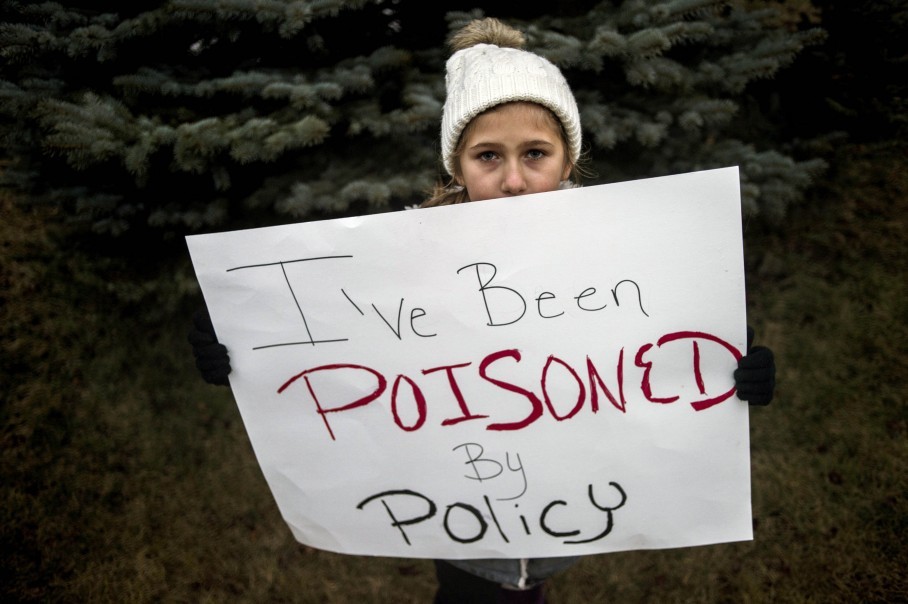Flint and the Myth of American Exceptionalism
“I remember when they built cars in Flint and you couldn’t drink the water in Mexico”
– Flint resident
The reality is setting in that Flint’s lead water poisoning scandal runs deeper than a few bureaucratic “mistakes” by local and state politicians. We watch with horror at every new revelation of official negligence, cover-up and willful blindness. We feel a tinge of guilt, perhaps, when we hear the United Nations chastise the City of Detroit for violating the human right to water. This kind of stuff doesn’t happen in the United States of America? The thing is – it does.
Let’s make a mutual commitment to bust wide open the myth of American Exceptionalism: that age-old mantra which tells us that the USA is the best country in the world. Poverty doesn’t exist here. We’re the freest people on the planet. The stars and stripes forever! It’s the founding myth of our country, at the heart of how we (as mostly-white descendants of Europeans) continue to view ourselves and the complicated world around us. And it’s just not true.
I say “we” as Europeans because the rest of this country figured out a long time ago that the great American Dream was a big nightmare. Blacks learned it from their elders who spoke about the disgraces of slavery, or from Martin Luther King, Jr. who railed against American imperialism and the war in Vietnam (“Somehow this madness must cease!”). Japanese Americans learned it from their forced internment in the 1940’s after the bombing of Pearl Harbor. I needn’t even mention where Native Americans learned it from. Hispanics and Latinos learned it from the constant toils of migrant farm work that doesn’t even garner minimum wage with the piece rates paid for buckets or bags of produce harvested. Those with brown skin that are fortunate enough to work waged jobs occupy lower positions and many live in constant fear of eviction by I.C.E. agents. The new majority in the USA – 50.3% of K-12 public school students were non-white in 2014 – understands what the minority doesn’t: this isn’t the land of the free for everyone.
Before you start calling me a traitor to the red, white and blue, let me make one thing clear: I love this country. I love the ideals upon which it stands, as embodied by American revolutionary Thomas Paine (“We have it in our power to begin the world over again”) and civil rights organizer Ella Baker (“Strong people don’t need strong leaders.”) My great-grandparents toiled in these cities to make a better life for me, and I wouldn’t trade it for any other homeland. I’ve been to over 30 countries in the last few years, speaking at conferences and in the streets with activists and change-makers who have propelled revolutions and overthrown corrupt regimes. I ascribe to the theory of change of the great Thomas Jefferson: “I hold it that a little rebellion now and then is a good thing, and as necessary in the political world as storms in the physical.” If there was ever a good time for a revolution in this country, it would be now.
The Flint water crisis has laid bare the travesty of poverty in the United States. One in four children in the state of Michigan lives in poverty. The very essence of life – clean drinking water and sanitation – has been violated for thousands of my compatriots in Detroit, Flint, and so many other cities. When people compare Detroit to a third-world country, they are not far from the truth. And yet their truth might mask a deeper one: our government and our business leaders treat us like “third-world” citizens, and nearly always have. There is no great utopian time in America to go back to, when all people were free – at best, there was a time when American capitalism felt the collectivist pressure of another surging world system, communism, and yielded more to its working people. The Flint sit-down strikes are long gone now, replaced by disaffection and political disengagement. The social contract – a good job for a hard-working person – has been broken. In most of the world, though, it was never signed.

Across the globe, countries of all levels of development have grappled with lead poisoning. The World Health Organization lists lead as one of the “top 10 chemicals of major public health concern.” A study by the Center for International Environmental Law looks at the human rights implications of lead poisoning, which kills 143,000 humans every year. Exposure to lead is tied to poor worker rights and dirty working conditions, high levels of poverty, and over-industrialization. That this is happening in a major American city doesn’t make the reality any different for the thousands of children and adults affected. This is a global problem, and we are no exception to the rule.
Admitting we are not exceptional does not necessarily condemn us to eternal poverty. When we realize that much of the world lives the same realities we do, we can look outward for guidance. We can avoid the same patterns of blind obedience to leadership and creeping corruption that keep billions of the world’s people in poverty. We can demand more of our leaders, or replace them with new ones, because we can acknowledge they are as imperfect as those “regimes” our media derides abroad. And maybe – just maybe – our leaders might eschew the same cold, careless indifference that so many world governments show to their poor and demonstrate true leadership in raising Flint and Detroit back up out of the ashes.


